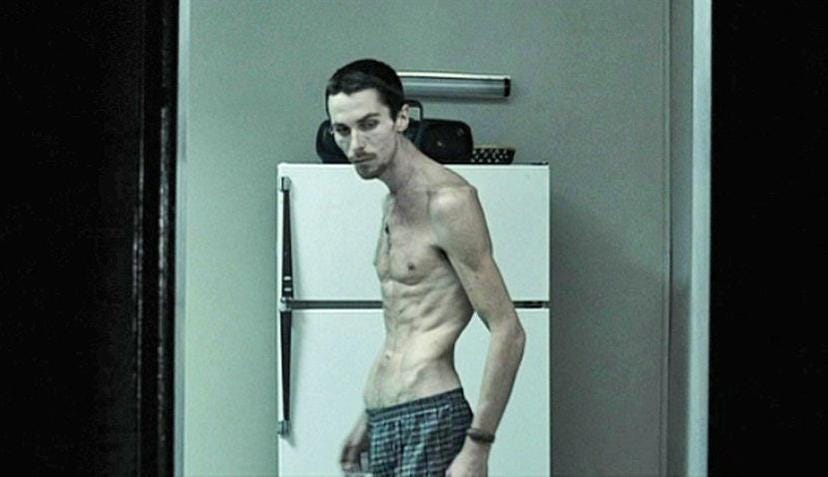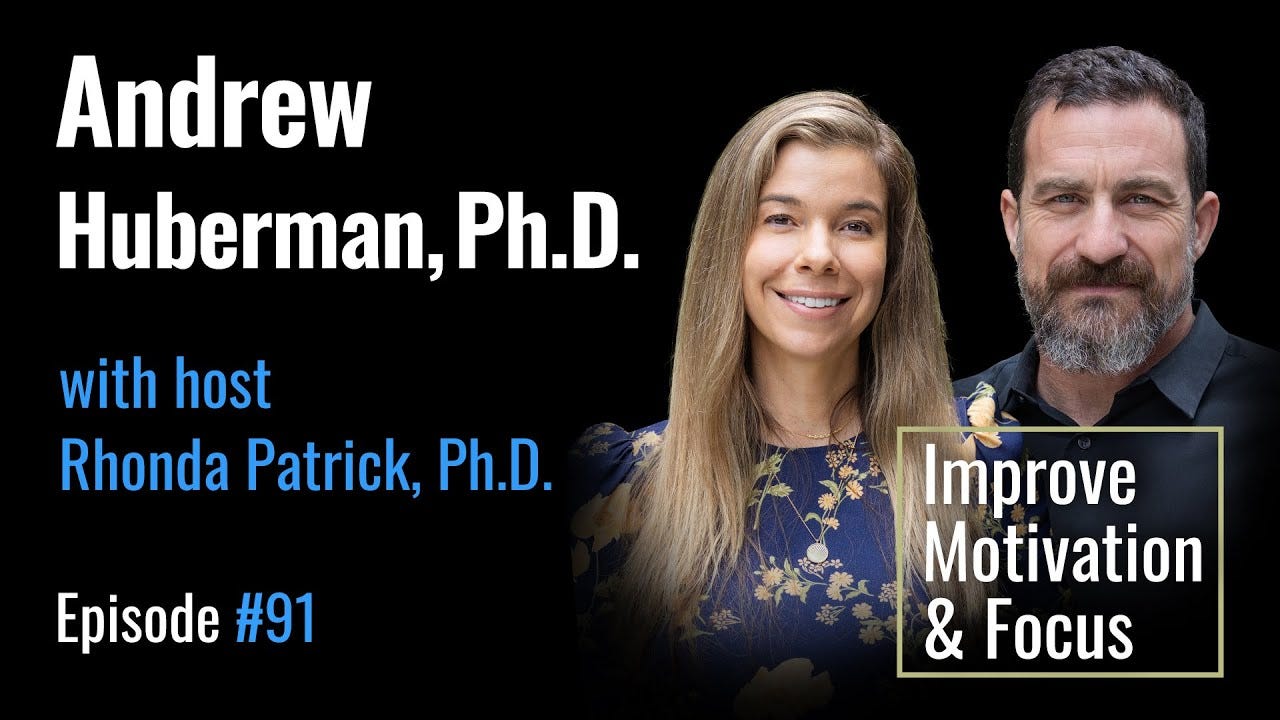Creatine made me gain 20lbs of muscle in one week.
When taking health advice from people with microphones goes wrong
Go to the gym on a weekday after work and you will see the following:
Hooded guy blasting Linkin Park through his headphones whilst fighting demons
Fitness influencer only training the gluteus maximus in front of their tripod
Loud, broccoli haired teenagers taking up space but not doing much exercise
Creatine
Creatine has been a gym staple since Jane Fonda’s workout tapes and for good reason. Unlike most gym supplements, it actually works. Results may vary but taking creatine will lead to an increase in muscle mass and strength. This has been known for decades. While there has been some debate around dosage, studies are aligned. If you don’t believe sissy scientists, ask a bodybuilder and they’ll tell you the same.
Yet suddenly creatine is appearing in places you would never expect. No longer relegated to workout sites, it’s now showing up in prominent podcasts, newsletters, and dinner party conversations. The Economist wrote about it last week and recently PGA tour golfer Ben Griffin blamed overdosing on creatine for his poor round.
This is thanks to the army of health gurus with microphones and dimmed out green screens. People like Andrew Huberman, Rhonda Patrick, and Peter Attia have elevated it from a strength-and-conditioning staple to a must-try bio-hack offering cognitive benefits and even the ability to offset sleep deprivation. Their audience, which numbers in the tens of millions hang on their every word.
As a mere mortal I wasn’t immune to the hype. I had tinkered with creatine early in my fitness days but never stuck with it. I was satisfied with my results without it, and stopped taking supplements after a bad experience with pre-workout (Jack3d should never have been legal).
After investigating some of the claims made by health influencers, I tried it for myself and the results were unexpected (to put it mildly). As I’ve previously documented by experience giving up coffee & alcohol, today’s article will discuss what the research says about creatine and what happened when I took it for 5 months.
Keep reading if you are interested if creatine might be right for you!
But first, make sure to hit the Subscribe button below to be one of the 1,000 Subscribers to Serviceable Insights to get articles like these, delivered directly to your inbox.
If this week’s article does not interest you, please check out some other recent ones:
What The Research Says
Muscle and Strength Gains
How Creatine Works
Your muscles and brain run on adenosine triphosphate (ATP). Creatine increases phosphocreatine, which enables faster ATP regeneration permitting your muscles to squeeze out an extra rep or sustain effort for longer. Over time, this translates into more training volume and growth. On top of that, creatine pulls water into muscle cells, making them fuller and triggering anabolic signals. So creatine lets you train more, which results in more muscle mass and greater strength.
A common question is how is this different from steroids? For one thing, creatine is a legal nutrient supplement, simply enhancing what you get from animal proteins. This helps accelerate ATP regeneration. Steroids on the other hand, are synthetic hormones that directly change your body’s physiology in order to boost muscle protein synthesis and recovery. This is why it can produce such rapid and dramatic increases in size and power. You are effectively turbocharging your hormones.
TLDR: Creatine tops up energy stores, steroids change your biology. Don’t do steroids. No matter how cool Sean Austin made it look in 51st Dates.
The Science Behind Creatine for Strength & Muscle Gains
The effectiveness of creatine isn’t just theoretical, creatine has gone through over 500 peer reviewed studies and 250+ controlled trials and held up to the scrutiny. Meta-analyses covering dozens of studies confirms creatine supplementation increases strength, power output, and lean body mass compared to placebo.
A highly cited example is a 2003 analysis of 22 trials published in the Journal of Strength and Conditioning Research, which concluded that creatine can increase strength gains by roughly 8% more than training alone. Another 2005 study from McMaster University, showed older men significantly increased muscle mass and bone density by taking creatine. Aging is associated with reductions in muscle mass and strength so if creatine is effective in helping older men gain or preserve muscle, then your gym bro should pass the shaker.
That’s not to say these results don’t apply to other demographic groups too. Plenty of studies looked at college aged, trained, untrained, women (pre and post menopause) and others. Basically it’s pretty universally accepted creatine works well for muscle gain and strength. With as little as 5g daily, you should expect to see an improvement of 5-10% after a few weeks. If you were to stop taking it, eventually your stores would go back to baseline levels but you won’t lose all the muscle and strength you gained.
Cognitive Benefits
Does Creatine Make you Smarter?
Like your muscles, your brain also runs on ATP. Expending mental effort burns energy. Creatine increases phosphocreatine in the brain, giving neurons a quicker way to regenerate ATP and keep firing under stress. Creatine doesn’t make you smarter but it can help you can handle a higher work capacity before tiring out, just like with your muscles.
I’m sorry to the people looking for a Bradley Cooper Limitless pill, creatine won’t increase your intelligence. The only confirmed way to boost your IQ is to Subscribe to Serviceable Insights.
Unfortunately, the science behind the cognitive benefits of creatine isn’t as solid as for muscle & strength gains and requires a bit more scrutiny. There are a few dozen studies and trials with positive results, but it’s far from a slam dunk.
For one thing, there are far fewer studies and many were on specific populations with a problem. This includes: sleep-deprived individuals, patients with neurological disease or vegetarians. You might wonder what’s the problem with the vegetarians? Well, they don’t eat meat.
This leaves them with lower creatine stores since meat and fish are the main dietary source of creatine. The next time a self righteous vegetarian/vegan tries to lecture you about how useless animal proteins are, just remember they are deficient from creatine and not thinking straight. So be nice to them.
Large Doses & Sleep Deprivation
In all seriousness, creatine seems to help these groups but results were less clear for young healthy omnivores. Some studies show promise, others lacked measurable effects. It appears the benefits of taking creatine for healthy adults already consuming animal proteins are largely muscular and not cognitive. Some studies tested larger doses (10 - 20 g daily) on healthy adults, yet were still inconclusive. Many health influencers such as Joe Rogan, Andrew Huberman or Rhoda Patrick advocated for creatine for cognitive benefits and even recommend larger doses because of studies such as the 2018 study Avgerinos et al. showed improvements in short term memory and reasoning but other studies failed to replicate this.
In their defense, an interesting insight came from pairing sleep deprived individuals with high creatine doses. The 2024 study by Gordji‑Nejad et al. gave a single large dose of creatine (0.35 g/kg translating to 25 g for a 150 lbs person) during 21 hours of sleep deprivation. It produced marked benefits for the subjects: processing speed improved by 16–29%, memory improved by ~10% and lower subjective fatigue by ~8%.
So according to the research, there might be some cognitive benefits in taking creatine if you are naturally deficient from your normal diet or after a bad night sleep. Beyond that, it’s too early to declare decisively there are meaningful cognitive benefits to taking creatine. However, individual experiences may differ…
My Experience With Creatine for 5 Months
The Three Horse People of Fitness Nutrition Advice
I’ve been following Dr. Rhoda Patrick’s Youtube Channel Found My Fitness for over a decade. I haven’t taken all of her advice but I’ve appreciated her scientific approach and willingness to experiment with new protocols herself. She has many videos, reviewing scientific literature related to exercise or nutrition science. She’s also had authors of highly cited studies on her channel to discuss their findings as well as other studies. Dr. Patrick has been promoting the use of creatine for years, but she has recently been emphasizing higher dosages and its use for cognitive benefits. She claimed to take high doses on days where she’s sleep impaired, usually when jet lagged due to her travel schedule.
She’s not alone in promoting creatine to her loyal audience. Stanford researcher and professor Dr. Andrew Huberman, has more than 7M Youtube subscribers and has quickly emerged as a leading internet personality on anything related to health. Like Dr. Patrick, he’s recommended creatine on his channel several times, at times referencing studies highlighting cognitive benefits. He’s another internet personality I’ve been following dating back to before the global pandemic. While some people have questioned his advice, like Patrick, his suggestions are generally grounded in scientific research, even if they aren’t always the consensus.
Finally you have Tim Ferris, famous for authoring best sellers such as The 4 Hour Work Week, The 4 Hour Chef or Tools for Titans. Ferris has been successful in many domains and has shown his willingness to treat himself like a human guinea pig. He might lack the scientific credentials of Patrick or Huberman, but he’s been early on many health & fitness trends and even ran a sports nutrition company before becoming an author. If you don’t know him, you can think of him as a master of efficiency/optimization. He too had been advocating for large dose creatine usage.
With these three strongly advocating for its use, and a bit of Googling, there didn’t appear to be a large risk in trying creatine so I thought it was worth giving it a shot.
What Happened?
Strength & Muscle
The last week of March, I ordered a small case of creatine along with bottle of Omega-3 pills. While some suggest doubling up the creatine dosage for the first few days, which they call the loading phase, I just stuck with the 5g daily dose first thing in the morning mixed in a glass of water. People will say bloating is normal during the loading phase, but this normally dissipates after 5-10 days. In my case, I gained 20 lbs during my first week of creatine use.
This was only with the 5g daily dose. This gain can’t be fully credited to the creatine; I temporarily upped my calorie consumption after realizing I was operating at a daily calorie deficit of 500 - 800 calories. I workout every day and don’t eat breakfast, so my under consumption of calories was definitely impacting my muscle gain. Even with this concerted effort to eat more, I was still operating at a deficit closer to 300-500 calories, so this weight gain was definitely not isolated to that.
After a few weeks I went back to my regular eating schedule and with my creatine stores saturated, my weight dropped by 5lbs. I was still 15lbs heavier than when I started, however my body composition had not materially changed. This was noticeable in the gym.
I’ve been training regularly for 16 years, which categorizes me as an experienced lifter. At this point, progress should come more slowly, unless I’m attempting new exercises or ones I haven’t tried in a while. This was not the case with creatine.
For a handful of exercises such as the incline bench press, flat bench press or the barbell front squat, within a few months of taking creatine, I was able to lift at least 10% more. Not only could I lift heavier weights and for more reps, I was no longer experiencing as great of a drop off between my third and fourth set of an exercise. This drop off is fairly common for lifters with a higher proportion of Type II (fast twitch) muscle fibers. This was something I had grown accustomed to and dramatically lowered my training volume during my workouts. With creatine, my training volume could climb considerably allowing for great strength and muscle gains which, were consistent with what the studies and fitness influencers claimed.
Now some of you might point out, the increased power output could have come from gaining weight. This could partially explain it but since I maintained or increased my output for exercises where body weight is a disadvantage such as for chin ups, TRX rows or box jumps, I still consider this valid. At the same time, my cardiovascular fitness improved despite carrying more weight.
TLDR: The Strength & Muscle Gain Research is Legit
Cognitive Benefits & Large Doses
When it came to cognitive benefits, I didn’t notice anything new from the adoption of creatine or Omega-3. I felt pretty good as a baseline, and since I regularly consume meat or fish to begin with, the additional creatine didn’t do much for me. Still consistent with the research.
Some of the fitness influencers said to get the cognitive benefits, you would need to do at least 15-20g, to break the blood brain barrier or whatever. So to test the claims by Rogan and Patrick, for a few weeks, I tried upping the dosage to 10g per day or 20g on days when I didn’t sleep well. Well this protocol did have a noticeable effect. It might not have sharpened my focus or improved my memory but it did a terrific job of disturbing my stomach; especially on the 20g days. As I attempted the higher dose four months into the experiment, my creatine stores were already saturated so adding the higher dose seemed like overkill. Even when I was sleep deprived, I didn’t feel any shaper with the higher dosage. One possible explanation could be for my bodyweight, 20g is insufficient, but that dose was already pretty difficult to consume and I wasn’t tempted to add even more.
My conclusion is the people telling you to consume large dosages are probably just trying to get you to go through your creatine supply faster to sell you more. Shampoo companies try the same strategy. Speaking of shampoo, on major concern people have with taking creatine is the link to hair loss. This came from a 2009 study on Rugby players that saw a 56% spike in DHT levels after a high-dose creatine loading (25 g/day). This appeared to be a one off that didn’t appear in other studies. In 2025, a randomized controlled trial specifically tested for this for 5g of daily creatine and it found no significant difference in DHT, DHT-to-testosterone ratio, or any hair growth metrics between the creatine and placebo groups.
If you are afraid to take creatine because of hair loss concerns, you shouldn’t be. In my case, my hair’s fine. If you really are concerned, don’t just take my word for it, I’m not a medical professional or scientist, just a guy writing on the internet. I shared a few studies, but there are plenty more, which might be more appropriate and applicable depending on your specific situation. Speaking only for my experience, I can say creatine delivered what I was hoping for with the strength and muscle gain but fell short when it came to the cognitive benefits. Is this conclusive? No, but just another data point for you to consider when you decide if creatine is right for you.
Thank you for reading. If you liked this article please Subscribe below. I publish articles on a wide range of topics from business, books, current events or anything on my mind.










Great post. Thanks for experimenting on our behalf :). What is the long term impact on kidneys because of prolonged creatine supplement intake? Any findings there ?
i just got on creatine, what do you think about peptides and collagen?